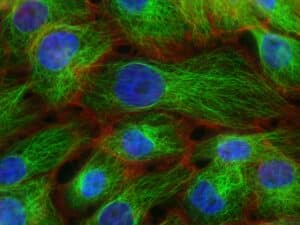Understanding ME/CFS
Researchers leading the largest study ever into ME/CFS (myalgic encephalomyelitis/chronic fatigue syndrome) are urging people with the condition to take part, before its 15 November deadline.
The study is looking to test 20,000 individual DNA samples, but thousands of people are still needed to hit that target number. ME/CFS has been estimated to affect more than a quarter of a million people in the UK, of all ages and from all social and economic backgrounds. Its core symptoms include post-exertional malaise (an excessive worsening of symptoms following minor physical or mental exertion), pain, fatigue, unrefreshing sleep and cognitive impairment. Causes of the disease are unknown and there is currently no diagnostic test, effective treatments, or cure.
Scientists from the University of Edinburgh are leading the DecodeME study which hopes to reveal the differences in a person’s DNA that can increase their risk of developing ME/CFS, aiding future research into its cause and the potential development of treatments. The study is in two parts: a detailed participant questionnaire, and DNA spit-kit test.
Individuals with ME/CFS aged 16 and over and based in the UK are invited to take part from home by signing up on the DecodeME website www.decodeme.org.uk and completing an online questionnaire by 15 November.
A team of genetics experts at the MRC Human Genetics Unit at the University of Edinburgh is conducting the scientific analysis of the study, led by Professor Chris Ponting. Professor Ponting was notably involved in the Human Genome Project, an international research effort to map the DNA sequence of an entire human genome.

Professor Chris Ponting said:
“We still need more people living with ME/CFS to sign up and take part in DecodeME. The final deadline to take part is 15 November at 5pm. Please, if you haven’t already, sign up to be part of this once in a lifetime opportunity to do something extraordinary for ME/CFS research.
“Genome-wide association studies, like the DecodeME study, have already proved successful in helping to uncover the biological roots of many other complex diseases including type 2 diabetes and Alzheimer’s disease. This is the first sizable DNA study of ME/CFS, and any differences we find compared to control samples will serve as important biological clues. Specifically, we believe the results should help identify genes, biological molecules and types of cells that may play a part in causing ME/CFS.”
The study is a co-production involving the University of Edinburgh, the charity Action for M.E., the Forward ME alliance of UK charities and people with lived experience of ME/CFS. The study is funded by the Medical Research Council (MRC) and the National Institute for Health and Care Research (NIHR).
Sonya Chowdhury, Chief Executive of Action for M.E. and Chair of the Management Group of the study, said:
“It has been extraordinary to see how the ME/CFS community has embraced this research. Thousands of people have already had positive experiences in taking part in DecodeME. We still need more people though, and this is the last chance to be part of this ground-breaking study as the 15 November deadline looms.
“We are grateful to the participants who have already signed up to take part in this very important study. We still need more to join us so if you, or someone you know, are 16 or older, live in the UK and have a diagnosis of ME/CFS, please do take part now to help us decode ME/CFS at www.decodeme.org.uk/portal.”
Following sign up and completion of the participant questionnaire by the 15 November deadline, those invited to participate in the DNA stage of the study will be sent a spit collection kit and have further time to send their saliva sample back to be analysed.
The study is led by the DecodeME Partnership which uniquely brings together a collaboration of researchers, people with ME/CFS, carers and the public to advance understanding of the disease.
Initial study findings from DecodeME’s first 17,000 participant questionnaires have found that women who have ME/CFS have more symptoms than men and are more likely to develop worse symptoms over time.
Of the 17,000 first questionnaires, 83.5% of respondents are women, but the team behind the research is encouraging individuals of all genders with ME/CFS to continue to take part whilst the study is still live.

































